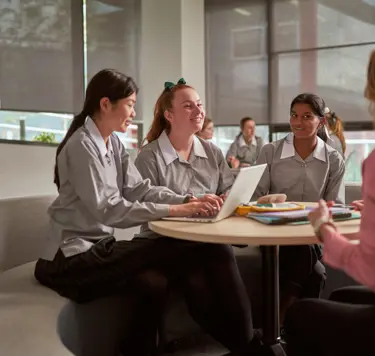Gifted education students solve the problems of the future
September 19th, 2024

September 19th, 2024
Gifted education at Methodist Ladies’ College (MLC) in Melbourne provides students with the chance to immerse themselves into a specific area of interest, with likeminded students, both at the College and across Australia.
For gifted students, working alongside others with similar perspectives and learning styles can be both empowering and enriching. A recent study by Australian Catholic University found that many gifted children are not offered programs that cater to their individual strengths or learning needs, with students seeking more challenging opportunities to build on their potential.
MLC is committed to understanding each students’ individual needs and supports gifted students through its Learning Diversity program, one of the most well-resourced learning enrichment and support programs in Melbourne. Gifted students benefit from a holistic approach within a differentiated classroom, where they are consistently provided with enrichment opportunities throughout their schooling. Furthermore, these classes are coupled with regular one-on-one wellbeing meetings to ensure that student needs are being effectively addressed.
MLC’s Learning Diversity program also extends to external initiatives that encourage students to think about global issues. One such program is Future Problem Solving (FPS), an inter-disciplinary research-based academic program that teaches collaboration, critical and creative thinking, and effective communication. MLC has offered the program since 2023, with selection based on data and demonstrated aptitude.
In this program, students are provided a global topic and follow a six-step process: brainstorming potential challenges related to the topic; identifying underlying problems that need addressing; generating solution ideas to tackle the problems; developing evaluation-criteria; applying criteria to solutions; and creating a plan of action to implement the chosen solution.
“Students in the FPS program are really encouraged to think beyond anything that is realistically possible right now, developing their creativity and problem-solving skills,” says Natasha Stewart, one of MLC’s Learning Diversity teachers.
“The FPS classes place students in a unique position where they are analysing potential challenges we may very well face soon. These students become well equipped to enter the unknown entities of our fast world.”
Learning Diversity teachers work with students, teaching them new and relevant content and develop the specific skills related to problem solving. A high level is dedication is needed to reach the International Conference level, requiring much of the work completed independently outside of class time.
“The students work extremely hard throughout the year, practicing their skills and competing in the qualifying finals, then reaching national finals. A lot of work researching, revising, memorising and conducting practice tests is required.” says Natasha.
This year, topics included Antarctica and tourism, both requiring students to undertake research, speak with experts in the field and participate in workshops. Based on their performance across the year, the top 10-15% of teams in Australia qualify for the National Finals, in which the best teams are subsequently invited to attend the FPS International Conference in the US.
After winning the FPS National Finals in Australia last year, three MLC teams advanced to the International Conference at the University of Indiana, USA. The teams included a Senior Team, a Middle Division Team, and a student who participated in the Multi Affiliate Global Issues Competition (MAGIC) team. The student in the MAGIC team achieved 1st place globally, while our Middle Division Team secured 3rd place in the world.
“A group of students from Year 11, Year 9, and Year 10, including myself, had the incredible experience of participating in the International Finals,” shares Eliza from Year 11. “We tackled a future scenario related to ‘Air Quality’ and worked on solving problems. It was a fantastic experience that allowed us to connect with people from all over the world.”
